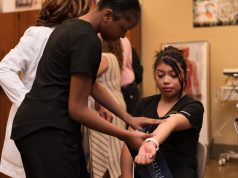By Ivan Holloway
The Birmingham Civil Rights District has stood the test of time as an area that saw relentless violent struggles and faced uprisings during the Civil Rights Movement of the 1960s. We recently reflected and remembered those four little girls who lives were tragically taken away during a bombing of the Sixteenth Street Baptist Church.
The nearby A.G. Gaston Motel served as a safe haven and meeting space for many Civil Rights activists, including the late Dr. Martin Luther King Jr. and Birmingham’s Rev. Fred L. Shuttlesworth. In Kelly Ingram Park police used dogs and high-powered fires hoses to attack peaceful protesters and members of the community.
If we take a moment to think back further in the early 1900s, segregation was designed to keep African Americans from tapping into our full potential and create lives that would greatly benefit our families. Because of those egregious laws, many Black business owners opened shops in the Historic 4th Avenue Business District. This district was a thriving, impactful, and Black business owners were able to establish themselves. From retail stores, social clubs, banks, movie theaters and more, Black business owners found success all along the corridor through the 1960s and, most importantly created, a sense of worth and pride among the community.
Significant Progress
Fast forward to 2020, our city has made significant progress in creating spaces for people from all backgrounds to succeed. From newly announced The Switch, Birmingham’s innovation district, Railroad Park, and other areas across Downtown Birmingham has come a long way to build and create more equity and inclusion. However, some districts like the Birmingham Civil Rights District including the Historic 4th Avenue Business District, deserve attention and support in order to continue to grow economically.
Urban Impact, a local non-profit that focuses on community and economic development in the Historic 4th Avenue Business District, and REV Birmingham, a place-based revitalization agency and economic non-profit that works to make the City of Birmingham a more vibrant place are developing a NW Downtown Birmingham Master Development Plan.
This master plan has the support from the City of Birmingham and other partners. The NW Downtown Quadrant of Birmingham includes the Civil Rights District and The Switch, known as the innovation district home to one of the largest technology incubators in the Southeast.
This master plan’s overall goal will be to drive future investment, growth, and development into these areas. This master plan will build on the recent planning projects that have already started, including Freedom Walk and the City Center Master Plan. Additionally, the plan will create a clear road map for implementing the community’s vision for this part of the city, which bringing urban districts and surrounding neighborhoods together to thrive as one.
As the master plan begins to take form, I know that many community members, specifically residents and business owners, may be hesitant about this process. This is NOT a plan that will eliminate or destroy the Civil Rights District’s legacy and historic meaning. This is NOT a plan where the very businesses and homes in the Civil Rights District, including the Historic 4th Avenue Business District will be left behind. This is NOT another attempt for more prominent agencies and developers to come into these districts and take over.
The vision that I want those in our community to understand about this master plan is that it will allow us an opportunity to preserve and protect our sacred spaces. This master plan was created with one goal in mind: drive economic growth and prosperity. The “Spirit of Collaboration” served as the theme for this master development plan.
Here it is that for the first time in a very long time, entities from all different backgrounds and ventures have come together to ensure that the Birmingham Civil Rights District continues to play a critical part in the economic and cultural future here in Birmingham. Innovation, harmony, and unity will be vital to see this master plan achieve its goals.
Community Roundtables
Beginning September 29, there will be a series of community roundtables where residents, businesses and property owners, and members from the faith community will be encouraged to hear the facts about this master plan and provide feedback and guidance on how this plan should be executed. Members of the community will also be asked to fill out a brief survey about the NW Downtown Birmingham quadrant and the master plan.
We are living in a time in this country where we are not only facing a pandemic, but we are fighting against injustices and the same systems that are set in place to keep our communities stagnant. With so much division, worry and fear impacting the way we live, it is encouraging to see that despite of it all, Birmingham continues to stand out and serve as an example of what inclusion is all about and also what can happen when we all come together for a common goal.
For more information about the Northwest Downtown Master Development Plan please visit www.nwbhamplan.com. Get the facts, get involved, let your voices be heard throughout this community-based process because this plan will not only revitalize the Birmingham Civil Rights District, but the effects of more economic growth and innovation will put the City of Birmingham as a whole in an even greater position to thrive and become a place where real inclusion and diversity live on.
Ivan Holloway is Executive Director of Urban Impact Birmingham.





